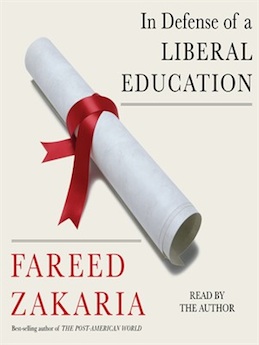By Lisa McDonald
In January 2014, President Barack Obama gave a speech at a General Electric plant that, while seemingly innocuous, stirred controversy over a particular sentence: “I promise you, folks can make a lot more, potentially, with skilled manufacturing or the trades than they can with an art history degree.” While he later apologized for the comment, his sentence embodies what the American mindset has turned to: the belief a liberal education is irrelevant in today’s technological society. But in late March, a new book from CNN host Fareed Zakaria was released by Simon & Schuster, In Defense of a Liberal Education. Through the pages of this book, Zakaria describes how he came to America specifically for the liberal education experience and expounds on the virtues of this educational model.
Growing up in India in the 1970s, Zakaria experienced a country focused on fields specializing in technology as a way to surmount domestic and economic hurdles. When it came time to enter college, he decided to follow in his older brother’s footsteps and travel to America, the land of liberal education. Initially, Zakaria intended to pursue medicine, but that changed after taking a popular lecture course on the history of the Cold World during his first year. Zakaria writes, “I had assumed that I would major in something that was practical, technical, and job oriented…[the Cold War] course, however, made me realize that I should take my passion seriously.” It’s through this first-hand experience that Zakaria begins his journey to appreciating a liberal education and promoting its values to the public.
Before elaborating on today’s liberal education experience, Zakaria takes a trip into the past, detailing the change that took place in ancient Greece twenty-five hundred years ago that shifted education’s focus from development of virtue and physical prowess to a broad education that would best support a democratic society. Zakaria follows the growth of this new model up to the current day, describing how the system’s emphasis on writing helped not only him but society at large, teaching students how to acquire knowledge while enjoying the experience of learning. He admits America shows poorly on international tests, yet the country still produces some of the world’s top innovators, a phenomenon he believes can be explained by an abundance of opportunites to pursue a liberal education. He ends his book by defending today’s youth and urging that everyone “could all use a little bit more of a liberal education.”
There has been plenty of positive reception for his book. In The Michigan Daily , Hailey Middlebrook writes: “Pulling quotes from scientific journals, Ivy League deans and corporate executives, Zakaria fleshes out his claims clearly and convincingly.” A writer for Kirkus Reviews also provides strong support, calling the book a “passionate appeal, for Americans in particular and the world at large, to rethink the benefits of a well-rounded, general education.” In an interview with Zakaria ABC host George Stephanopoulos agrees with Zakaria’s recommendation, adding that “any parent should read this book.”
However, in Zakaria’s pursuit of promoting liberal education some among of the STEM community criticize him for lowering the value of STEM careers. On the Physics Today website, Steven T. Corneliussen, a media analyst for the American Institute of Physics, defends STEM fields: “[Zakaria] proposes that ‘no matter how strong your math and science skills are, you still need to know how to learn, think and even write’—as if study of STEM subjects doesn’t inculcate those abilities.”
In The New York Times, Kevin Carey defends the importance and timeliness of the book, pointing out that the “tension, however, between work-oriented learning and the liberal arts is not always as acute as Zakaria implies…but his book is an accessible, necessary defense of an idea under siege.”
Regardless of the opposing stances on what is truly the superior educational model, Zakaria makes the valid point that before all else the best education is received when students are passionate about the subject they are studying. This is noticed by Middlebrook in her article as well. “In the end,” she writes, “college is the place to find our passions…we succeed by learning from each other, by collaborating our strengths and weaknesses…we shouldn’t be scared to admit them.”
Lisa McDonald is a sophomore at Coe College majoring in Physics and Communication Studies. Coe College is home to the Epsilon of Iowa Chapter of Phi Beta Kappa.




